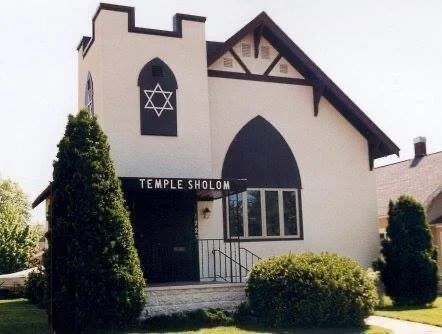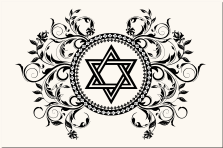
We have history here.
Be a part of that history.
Since before 1854…….
Temple Sholom’s earliest records show the Jewish community has been here since before 1854. This was a time when Jews from the East Coast were moving west and becoming more concentrated in larger Midwest cities like Madison and Milwaukee. From there, Jews moved west to the beautiful Chippewa Valley.
As the Jews grew in number, more infrastructure was needed and the Jewish cemetery was established in 1885. In 1887, the Chippewa Valley Ladies’ Aid Society was established as a Jewish charitable and communal organization. Additionally, a Hebrew school as in operation around the turn of the century, providing the foundation for the Jewish education in the area.
In the early days, the congregation did not have a building of its own. The congregation held High Holy Day services in rented spaces such as the Eau Claire Hotel or the Knights of Pythias and met for other events in members’ homes.
Finally, the Wesleyan Church was purchased in 1960 as the first permanent synagogue space and regular services began to take place there.
In 1969, Temple Sholom formally affiliated with United Synagogue of America, the organization of Conservative Judaism, and continues to maintain that affiliation through the United Synagogue of Conservative Judaism.
As an open and progressive congregation, Temple Sholom was in the forefront of introducing gender-equality into ritual practice and the structure of Jewish benevolent organizations. In 1972, Temple Sholom was one of the first Conservative synagogues in the country to allow women to be counted for minyan (10 adult Jews) required for the recitation of certain prayers and to honor women by calling them to recite the blessings on the Torah. Also in 1972, the men’s B’nai Brith chapter voted to drop the clause limiting membership to men, and thus combined the men’s and women’s chapters. This action received national attention.
Over the years, a number of rabbis came from the Minneapolis/St. Paul area to conduct High Holy Day services and for such special events as weddings, funerals and bar mitzvah celebrations. Rabbi Louis Milgrom performed these services from 1960 until the late 1980s. Rabbi Milgrom also taught courses on Judaism and the Holocaust in the Department of Philosophy and Religious Studies at the University of Wisconsin-Eau Claire, supported by special funds donated by the L.E. Phillips Family Foundation.
In 1989 the seemingly impossible task of securing a permanent rabbi began to be discussed. Stimulated by a matching grant from the L.E. Phillips Family Foundation, the congregation was able to raise sufficient funds to support a rabbi.
Rabbi Yosi Gordon was the community's first permanent, albeit part-time, rabbi and was Rabbi of Temple Sholom and chief rabbi of the Chippewa Valley from 1990 until Rosh Hashana 5969 (Sept. 2008). The search for a successor for Rabbi Gordon was concluded in the Spring of 2008, when Rabbi Jonathan Perlman was selected. Rabbi Perlman was the Rabbi for a year. After him, we were then able to find Rabbi, Shosh Dworsky. She was with us for a decade, then on to Rabbi Natalie Shribman. She led our community for 2 years & helped us through the pandemic. Now we are led by Leigh Crow.
Shosh was with our congregation for more than ten years before she retired as our Rabbi. She brought so much to our congregation with her incredible knowledge and beautiful musical talents, wonderful teaching skills with individuals of all ages. Like all good things, our time with Rabbi Shosh has come to an end as she is retiring. We are excited to be moving forward with the benefits that come from a long history, and have a new rabbi join us who will lead us into the future for the Jewish community in the Chippewa Valley. We will miss Rabbi Shosh and her guitar and all of her wisdom. Thank you Rabbi Shosh for ten beautiful years. You will always be a part of our community. Don’t be a stranger.
For 2 years, we had Rabbi Natalie Shribman as our Rabbi; she helped us to grow as a community for which we are grateful. Unfortunately, she has relocated and we are once again without a Rabbi. We decided to put the search on hold for the foreseeable future.
We are fortunate enough to have a wonderful, musical, & well-educated in all things Jewish, member of our Temple who has stepped into the role of Religious Leader. Leigh Crow took on this position last year (2024) & will continue on for now. She has been a great addition to our community & we are truly blessed to have her in her current role.



